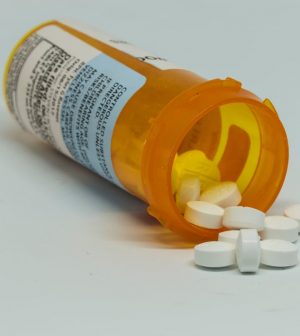- Could Your Grocery Store Meat Be Causing Recurring UTIs?
- Are You Making This Expensive Thermostat Error This Winter?
- Recognizing the Signs of Hypothyroidism
- 10 Strategies to Overcome Insomnia
- Could Artificial Sweeteners Be Aging the Brain Faster?
- Techniques for Soothing Your Nervous System
- Does the Water in Your House Smell Funny? Here’s Why
- Can a Daily Dose of Apple Cider Vinegar Actually Aid Weight Loss?
- 6 Health Beverages That Can Actually Spike Your Blood Sugar
- Treatment Options for Social Anxiety Disorder
Supreme Court Rejects Purdue Pharma Opioid Settlement

The U.S. Supreme Court on Thursday struck down a controversial settlement that drug maker Purdue Pharma had reached with victims of the opioid epidemic.
The ruling threatens a massive bankruptcy plan that would have protected the Sackler family, which controls the company, against future lawsuits in exchange for sending billions to opioid victims and states harmed by the crisis.
Why did the court reject the settlement? In the 5-4 vote, the justices said the bankruptcy court lacked the authority to extend that protection to the Sackler family.
“The Sacklers seek greater relief than a bankruptcy discharge normally affords, for they hope to extinguish even claims for wrongful death and fraud, and they seek to do so without putting anything close to all their assets on the table,” Justice Neil Gorsuch wrote in the court’s majority opinion. “Describe the relief the Sacklers seek how you will, nothing in the bankruptcy code contemplates [much less authorizes] it.”
But Justice Brett Kavanaugh noted in a dissent that the ruling will have a “devastating” impact.
“As a result, opioid victims are now deprived of the substantial monetary recovery that they long fought for and finally secured after years of litigation,” he wrote in the dissent.
The case dealt with the fate of Purdue Pharma and its leaders, who produced and promoted the opioid medication OxyContin in the early days of the opioid epidemic.
In the settlement, the Sackler family had agreed to pay $6 billion to families and states as part of an agreement to wind down the company. In exchange, the Sackler family would be protected against future civil liability claims.
Purdue first marketed Oxycontin as a safer, less addictive painkiller, encouraging doctors to prescribe the drug for longer periods of time and for more routine injuries.
But a series of lawsuits claimed the family continued to promote Oxycontin even after it learned how addictive the drug really was.
In a statement released after the ruling, Purdue Pharma said, “We are reaching back out to creditors and renewing our pursuit of a resolution that delivers billions of dollars of value for opioid abatement and allows the company to emerge from bankruptcy as a company with a public-minded mission.”
In a separate statement, the families of the late Mortimer Sackler and the late Raymond Sackler expressed disappointment with the decision, CNN reported.
“The Sackler families remain hopeful about reaching a resolution that provides substantial resources to help combat a complex public health crisis,” the statement read. “The unfortunate reality is that the alternative is costly and chaotic legal proceedings in courtrooms across the country. While we are confident that we would prevail in any future litigation given the profound misrepresentations about our families and the opioid crisis, we continue to believe that a swift negotiated agreement to provide billions of dollars for people and communities in need is the best way forward.”
More information
The U.S. Department of Health and Human Services has more on the opioid crisis.
SOURCE: U.S. Supreme Court ruling, June 27, 2024; CNN
Source: HealthDay
Copyright © 2026 HealthDay. All rights reserved.










